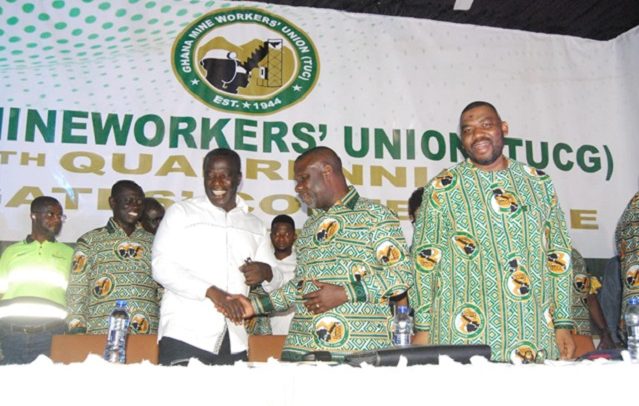
The Ghana Mineworkers’ Union (GMWU) of the TUC held its 12th Quadrennial Delegates Conference at Tarkwa in the Western region on December 13, as the mining sector continues to witness massive transformation in its labour market and labour relations landscape.
This was amply demonstrated by GMWU General Secretary, Comrade Abdul-Moomin Gbana, when he delivered his address and stated that these are largely fuelled by the ever-increasing pursuit of supernormal profits characterised by aggressive cost reduction strategies, the rise and use of technology, and the strong trend toward new levels of personalisation and individualisation of labour and employment relations, as against collectivism and collective bargaining.
“These transformations have and continue to reconfigure the labour market, and are shaping the demand for jobs and skills of tomorrow in the sector.”
He added that the forces of globalisation have led to a globalised labour market, impacting job security, income inequality and the ability of trade unions to organise and protect workers’ interests.
Comrade Gbana noted that the transformational changes taking place in the country’s mining labour market, unfortunately, have resulted in a marked shift in the nature of employment away from standard or permanent employment to non-standard forms of employment (including temporary work, casualisation, fixed-term contract work).
“In 2018, a study conducted by the Union established among other things that non-standard forms of employment had outstripped standard employment by close to 60%”.
This narrative has slipped even further, with over 90% of the mining sector workforce currently engaged in non-standard forms of employment, with standard employment sitting at just about 10%, the GMWU General Secretary observed.
As a result of this significant shift exacerbated by the continuous fragmentation of production and outsourcing, workers now have lower levels of employment protection, high degrees of uncertainty and face higher risks in respect of workplace accidents or injuries, he lamented.
“There has been a surge in workers and trade union rights violations, a shrinking collective bargaining coverage, job insecurity – threatening social protection cover and creating fluctuations in income and pensions”.
While these non-standard forms of employment provide employers with flexibility and enhanced profits, they often come at the expense of workers’ job security, benefits and bargaining power, posing challenges for labour and trade union rights, the GS (GMWU) added.
He therefore used the Delegates’ Conference to appeal for the Minister of Employment and Labour Relations to quicken the review of Labour Act 2003 (Act 651); and also pay particular attention to strengthening and resourcing labour administration institutions such as the Labour Department and National Labour Commission, and to ensure workers’ rights are respected and that labour standards remain relevant and effective in the face of a rapidly changing world of work.
On his part, Minister for Employment and Labour Relations, Ignatuis Baffour Awuah, stated that mining is the country’s largest tax-paying sector with significant contributions to gross domestic product (GDP) and employment.
“According to the Ghana Revenue Authority, the mining sector’s fiscal payments in 2022 amounted to GH¢6.38billion – representing 18.6% of aggregate direct domestic tax receipts. In the first-half of this year, all sub-sectors of industry contracted.”
GMWU National Chairman, Kwarko Mensah Gyakari, added his voice and said non-standard forms of employment are the most destructive working arrangements; and that the ill associated with this form of employment is that there is a serious power imbalance in employment – to the extent that workers are left with little or no power to compete, and as a result they become vulnerable to the exploitative interests of employers.
The post Non-standard forms of employment dominating mining landscape appeared first on The Business & Financial Times.
Read Full Story




















Facebook
Twitter
Pinterest
Instagram
Google+
YouTube
LinkedIn
RSS